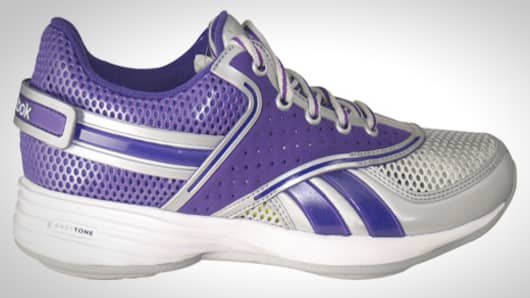Wednesday morning, the Federal Trade Commission announced that it would settle its case with Adidas' Reebok brand for its deceptive claims about its EasyTones thanks to a $25 million settlement that will be used to refund customers.
It appeared that the company has also taken off all previous claims about the shoe on its consumer website.
Like the rest of the category, the company said that its purposely unstable foundation allowed the wearer could tone her hamstrings, calves and butt up to 28 percent. A tag on EasyTones told the consumer that air pockets built into the shoe created natural resistance that led to this muscle toning.
Reebok said that its research came from wear-testing its shoes on hundreds of people, with more than 20,000 hours of data collected, though the company never published the findings. But independent reports suggested that the results weren't as clear. The American Council of Exercise called the claims "far fetched" and independent studies at UNLV, University of Wisconsin-Lacrosse and the University of Calgary showed no difference in women wearing toning shoes versus the average sneaker. The only real positive buzz came from the American Podiatric Medical Association which said that the toning products were "beneficial to foot health and of significant value."
Then came the lawsuits.
Last year, two class action lawsuits were filed against Reebok for misleading consumers with deceptive advertising.
Other lawsuits were leveled against other shoe brands that made toning shoes including Skechers (Shape-Ups) and New Balance (Rock & Tone).
But this didn't halt any of the companies from building out their toning lines.
Toning rose to a $1.1 billion market last year and although the prices have come down by about 40 percent only seven percent fewer units have been sold, according to Matt Powell, analyst for SportsOneSource, a market tracking firm. Powell said Skechers, which says it has over 20,000 happy customers and funded four studies to back its claims, went into the men's toning business, while Reebok took to toning flip flops. It was lucrative. Reebok (42% share of toning), bought for $3.1 billion by Adidas in 2004, finally had achieved relevancy. Skechers (48 percent share of toning) vaulted to the number 2 shoe brand in America behind Nike .
Although the fine wasn't all that steep, the FTC getting involved might fizzle the entire category. Consumers who bought into claims will now be faced with stories about the government saying many of those claims were false. The pressure will now be on these companies to back up their claims with independent published data, which doesn't currently exist.
One company that is likely relieved today is Nike, which refused to get into the toning game. The company even boldly ran ads with the copy saying, "This shoe works if you do" with "The Ultimate Quick Fix" in big letters. At the time, a Nike spokesman told CNBC that Nike was not willing to "compromise on performance, stability and flexibility."
UPDATE - Statement From Reebok:
"We stand behind our EasyTone technology – the first shoe in the toning category that was inspired by balance-ball training. Settling does not mean we agree with the FTC’s allegations; we do not. We have received overwhelmingly enthusiastic feedback from thousands of EasyTone customers, and we remain committed to the further development of our EasyTone line of products. Our customers are our number one priority, and we will continue to deliver products that they trust and love."
Questions? Comments? SportsBiz@cnbc.com



